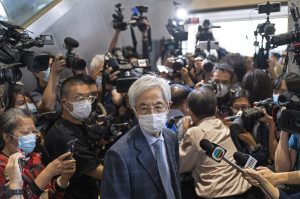On a sunny day in early 1988, Martin Lee addressed a crowd of Hong Kong people advocating for direct elections in the city, which was then a British colony. The government had just announced a White Paper proposal to add only 10 seats of directly-elected councillors in the 1991 elections – a move pro-democracy activists like Lee saw as a slap in the face to residents fighting for a say in their home.
“I’m asking you one more time: do you accept this White Paper?” Lee shouted, raising a copy of the proposal high into the air.
“No!” the crowd yelled in response.
“Neither do I!” he shouted, flinging the paper to the ground. Later, Lee and other activists proceeded to burn the proposal. A pro-democracy banner tied to a bunch of balloons was released into the sky.
Decades later, Lee’s dream of achieving fully direct elections seems like a distant memory. In the wake of a massive pro-democracy movement that began two years back, Beijing is now tightening its grip on the territory, by clamping down on dissent and implementing reforms that eliminate mechanisms of self-governance in the postcolonial city.
In late March, Chinese leaders passed sweeping changes to the electoral system that slashed the number of directly elected seats by nearly half, and required candidates to be pre-screened by a pro-Beijing committee, in a bid to ensure only “patriots” run for office. Last year, Beijing passed a national security law that criminalizes many forms of dissent and has led to a string of arrests of pro-democracy figures.
Earlier this month, Lee, now 82, was among a group of seven democrats convicted for organizing and participating in an unauthorized assembly on August 18, 2019, when about 1.7 million gathered to rally against the use of force by police during protests. The seven had pleaded not guilty.
Known by many as the “father of democracy,” Lee has dedicated his life to advocating for democracy. He played a part in negotiating the city’s handover to China in the 1980s, helped write Hong Kong’s constitution, and led the pro-democracy camp during the transition to Chinese rule, before retiring from his role as a lawmaker in 2008.
Found guilty on April 1 along with other prominent pro-democracy figures such as former lawmaker Margaret Ng and media tycoon Jimmy Lai, Lee was given a jail sentence of 11 months, suspended for 24 months. Last week, the Hong Kong Bar Association announced it was investigating Lee and Ng, following their convictions.
For many, Lee’s arrest and conviction signal a cataclysmic shift in the city’s political climate. His case sends the message that even critics of Beijing who are considered moderate in the eyes of the public will not be tolerated.
In recent years, Lee, who has repeatedly been called a traitor by Beijing, has been slammed by protesters in Hong Kong for his insistence on criticizing demonstrators’ violent tactics and calling for compromise with the Chinese government.
Young protesters in particular have become disillusioned by the ineffectiveness of using peaceful means to achieve democracy – ideas that Lee and other “moderate” activists from previous generations have stood firmly by.
Yet despite failing to bring Hong Kong genuine democracy after decades of activism, Lee has stuck to his idealism. And he’s still fighting for the dream he’s harbored since the 1980s, in the face of mounting challenges.
“Hong Kong operates as an oasis of freedom because our people have long fought off China’s efforts to import communist concepts such as ‘subversion,’ which in China is frequently used to send peace-loving political critics to jail,” said Lee, in an op-ed published by the Washington Post last year, where he described his arrest as part of China’s “larger plan.”
“We can all hope a vaccine is soon developed for the coronavirus,” Lee wrote last April. “But once Hong Kong’s human rights and rule of law are rolled back, the fatal virus of authoritarian rule will be here to stay.”

































